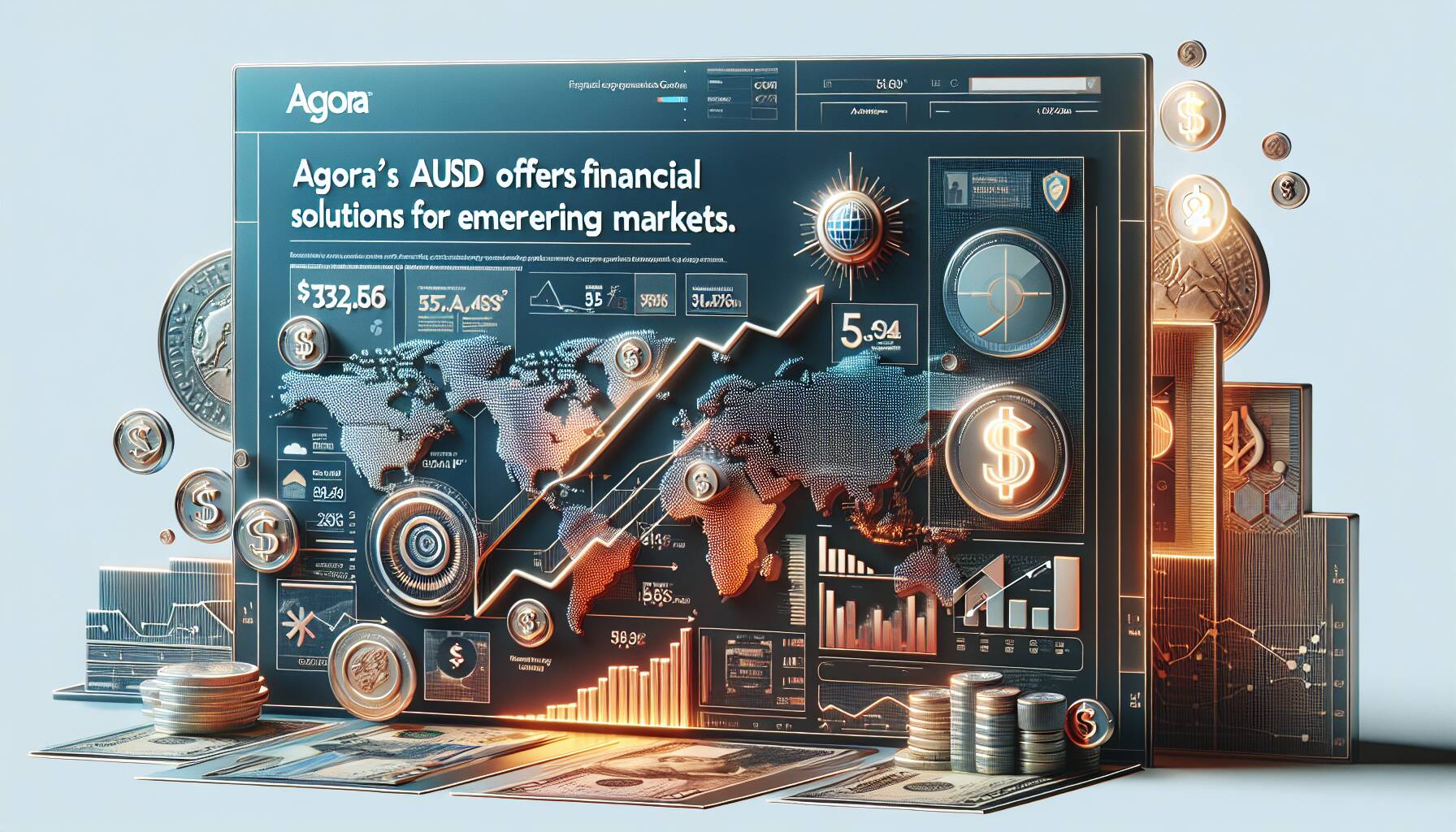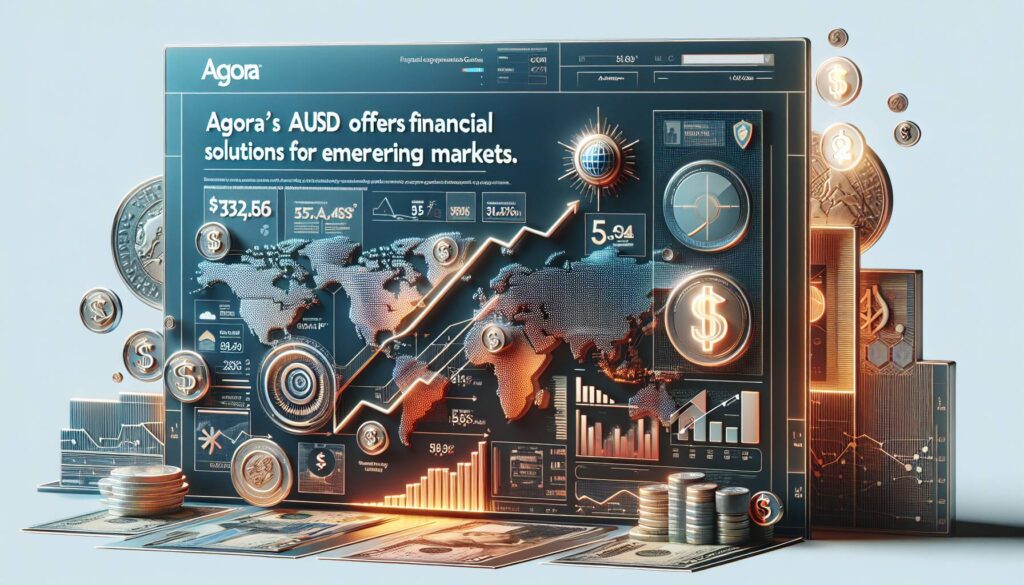Nick van Eck, the CEO and co-founder of Agora, has traveled extensively across emerging markets, gaining insights into the pressing issues brought on by currency debasement and inadequate financial systems. His observations have culminated in the development of AUSD, Agora’s flagship stablecoin, which aims to tackle these unique challenges faced by nations like Argentina and India. In a recent interview with CoinDesk, van Eck emphasized the transformative potential of stablecoins, stating, “With stablecoins, people in places like Argentina or India can save money without worrying about inflation or capital controls.”
Van Eck’s journey from a technology investor to founding Agora has been fueled by his belief in blockchain as a means to create an open financial system. His experience during the DeFi summer of 2020 highlighted the distinct advantages blockchain applications could provide compared to traditional financial services. The inspiration for Agora’s mission stems from van Eck’s personal connections to the struggles of financial instability, particularly through his family’s history with economic challenges.
“I feel very fortunate to have traveled to parts of the world where access to financial services and opportunities is far more limited than what Americans often take for granted,” van Eck noted.
Agora distinguishes itself in the crowded stablecoin market through its commitment to “credible neutrality.” Unlike some competitors, Agora promises simplicity and transparency, with a model that ties directly to the U.S. dollar held in reserve, ensuring that each AUSD is backed by a dollar in a bank account. This approach aims to create a more reliable digital dollar network that fosters cooperation rather than competition with businesses that utilize AUSD.
The significance of stablecoins extends beyond simple trading; they are crucial in providing a stable unit of account for regions with restricted access to financial services, particularly in Asia. “Stablecoins are the lifeblood of the crypto economy,” van Eck remarked, highlighting their capacity for wealth preservation, lending, and alternative financial solutions in emerging markets where volatility in local currencies is common.
However, despite the opportunities, stablecoins face regulatory hurdles that can impede their adoption in traditional markets. Clarity on compliance and legal frameworks remains a necessity for many businesses looking to utilize stablecoins efficiently. Van Eck believes we are on the cusp of a substantial journey toward mass adoption, particularly in the Asian market, where demand for cross-border payments and a burgeoning underbanked population offer fertile ground for growth.
In conclusion, van Eck envisions a future where stablecoins become the standard for cross-border payments, potentially revolutionizing the way transactions are conducted globally. As the cryptocurrency landscape continues to evolve, Agora’s efforts signal a growing understanding of the vital role stablecoins play in enhancing financial accessibility and resilience in a rapidly changing world.

Impact of Stablecoins in Emerging Markets
Nick van Eck, CEO and co-founder of Agora, emphasizes the transformative potential of stablecoins like AUSD for individuals in emerging markets. Here are the key points derived from his insights:
- Stability in Unstable Economies:
Stablecoins provide a safe haven for individuals in countries facing inflation and currency debasement, enabling them to save money without fear.
- AUSD’s Approach:
AUSD is designed to be credibly neutral, ensuring that users benefit without competition from fiat or other financial services.
- Access to Financial Opportunities:
With the potential to access DeFi tools, communities can engage in wealth preservation, lending, and other financial services previously inaccessible.
- Barriers to Adoption:
Regulatory clarity is crucial for businesses to utilize stablecoins efficiently, impacting their broader acceptance and integration into traditional markets.
- Asia as a Catalyst:
The demand for cross-border payments in Asia positions the region as a leader in stablecoin adoption, giving rise to opportunities for innovative financial solutions.
“With stablecoins, people in places like Argentina or India can save money without worrying about inflation or capital controls.” – Nick van Eck
The information presented offers insights into how stablecoins can significantly improve the financial stability and opportunities for individuals living in areas with underdeveloped financial systems.
The Rise of Agora’s AUSD: A Game Changer for Emerging Markets
In the rapidly evolving landscape of digital finance, Agora’s stablecoin, AUSD, offers a fascinating glimpse into the potential of blockchain-based payment solutions tailored for emerging markets. Nick van Eck, the driving force behind Agora, articulates a vision where stablecoins become a lifeline for individuals in countries burdened by currency debasement and fragile banking systems. This focus on destabilized economies places Agora’s AUSD among compelling competitors in the digital currency market.
Advantages of Agora’s AUSD: The standout feature of AUSD is its commitment to “credible neutrality.” Unlike established players like USDT or USDC, which may have affiliations affecting their operational motives, AUSD’s straightforward approach allows users to convert dollars directly into stablecoin at a 1:1 value, providing much-needed trust and transparency. Such factors can dramatically appeal to populations in places like Argentina, where the local currency faces continual instability.
Moreover, van Eck’s experience with financial challenges faced by immigrants adds a nuanced understanding of the target audience’s needs. AUSD’s design not only caters to financial safety but also empowers users with opportunities previously out of reach, promoting broader economic inclusion. These advantages could foster rapid adoption in areas where traditional banking systems falter, potentially transforming the financial landscape in emerging regions.
Challenges and Competitive Disadvantages: However, the road to adoption is fraught with challenges. Regulatory hurdles pose significant obstacles for AUSD’s integration into existing financial infrastructures. Competing stablecoins like PYUSD, backed by larger financial institutions, benefit from established trust and compliance, which can offer a perceived safety net to users wary of new technology. As such, AUSD must prove its reliability not only through performance but also by navigating complex regulatory landscapes effectively.
Additionally, while AUSD excels in stablecoin functionality, its success hinges on mastering the intricate web of market demands in diverse regions. Rising competition from firms offering similar products may dilute market share and present challenges in distinguishing AUSD’s offerings as the first choice for consumers and businesses alike.
Who Benefits and Who Faces Challenges? The introduction of AUSD stands to benefit unbanked and underbanked populations across Asia and Latin America, where reliable savings mechanisms are paramount. For these individuals, the ability to utilize a stablecoin that is free from burdensome banking fees or oppressive inflation is not just liberating; it is transformational. Furthermore, businesses in these regions could leverage AUSD for easier international transactions, enhancing their competitive edge in global markets.
Yet, established financial institutions may perceive AUSD as a threat to their revenue streams, particularly if it offers more favorable conditions for transactions and savings. Thus, while AUSD presents viable alternatives for consumers, it may also disrupt traditional banking practices, stirring resistance from financial entities that benefit from the status quo.
As we observe the unfolding narrative of Agora and its stablecoin, it’s clear that AUSD possesses both the potential to empower individuals in emerging markets and the challenges inherent in distinguishing itself in a crowded field. The next few years will be vital in determining whether AUSD can sustain its competitive edge and drive meaningful change in global finance.
















